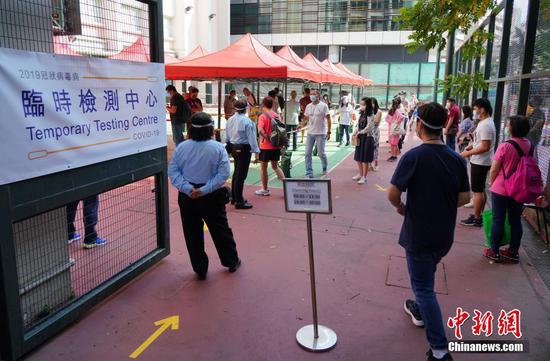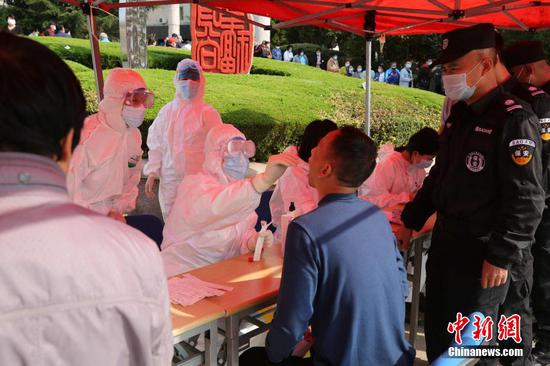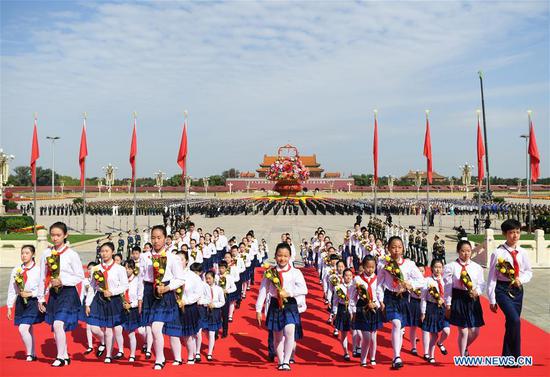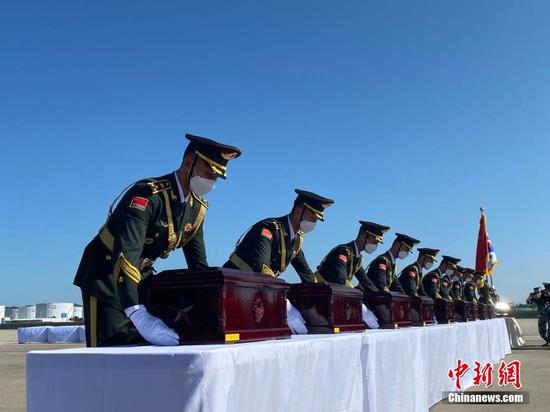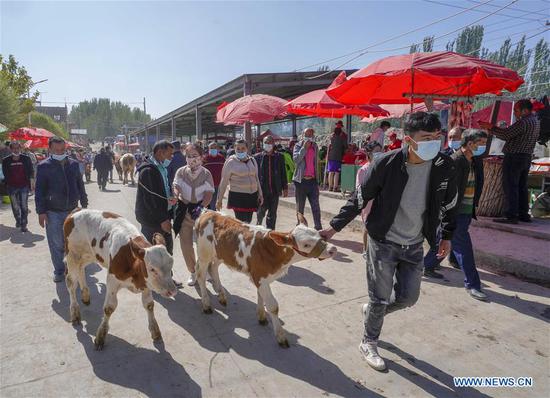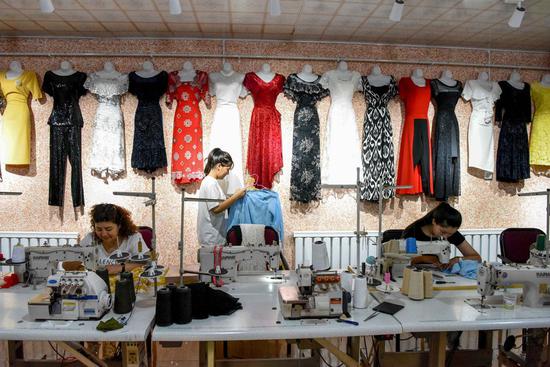
Workers make clothes at a clothing sewing cooperative at Daxi Village in Yuli County, northwest China's Xinjiang Uygur Autonomous Region, Sept. 4, 2020. (Xinhua/Ding Lei)
Recently, some western think tanks have published reports saying that forced labor is a widespread phenomenon in Xinjiang, and some western politicians are also clamoring for “the use of forced labor in Xinjiang.” So is there the alleged forced labor? With this question in mind, the Xinjiang Development Research Center invited relevant experts and scholars to investigate the employment situation of ethnic minorities of Xinjiang.
The investigation team made field visits to more than 70 enterprises, rural labor cooperatives and individual business start-ups in Ili, Karamay, Shihezi, Kashgar, Hotan, Kizilsu and Aksu in Xinjiang as well as cities outside the region like Beijing and Tianjin. They held talks and interviewed more than 800 company managers, employees, the self-employed and ethnic minority employees, and studied 26 government documents issued since 2016 and 48 related academic papers published since 2005. Through comprehensive analysis, the team has concluded that the governments at all levels and the relevant enterprises in Xinjiang and other provinces or cities have actively helped Xinjiang’s ethnic minority groups find jobs and fully safeguarded their basic rights such as the labor right and the right to development. People of all ethnic groups voluntarily work, choose jobs and start their own business, and thus the so-called forced labor doesn’t exist at all. The claims of some western think tanks are false, and their relevant arguments and bases are unscientific.
1. Analysis of the Employment Aspirations of Ethnic Minorities in Xinjiang
There are three ways of employment for ethnic minorities in Xinjiang: local employment nearby their homes, employment within Xinjiang, and employment in inland cities in China. The investigation found that the employment of minority people are obviously voluntary, independent and free.
1)The Minority People Have a Strong Desire to Go out for Employment.
By holding informal discussion with Department of Human Resources and Social Security of Xinjiang Uygur Autonomous Region, the investigation team learned that various industries in the four prefectures of southern Xinjiang have developed rapidly, but they still cannot satisfy the local people's needs for employment. More and more urban and rural surplus laborers in southern Xinjiang have turned their eyes to cities in northern Xinjiang and comparatively developed cities in inland China with higher wages, more comfortable living conditions and better working environment. A research by the Department of Human Resources and Social Security on the employment intentions of ethnic minorities in the four prefectures in Southern Xinjiang showed that the willingness of urban and rural surplus labor force to go out for employment is very strong.
For example,Aybagh Village in Kashgar Prefecture’s Gulbagh Town has a population of 3,540, among whom 1,509 are laborers, and 1,288 of them are willing to go out for employment, accounting for 85% of the total labor force of the village. The three villages in Baghchi Town, Hotan County, Hotan Prefecture have a total population of 5,307 people, among whom 1,699 are laborers, and 1,493 people of them are willing to go out for employment, accounting for 88% of the total labor force. That means, 86.5% of the labor force in the four villages are willing to work outside their hometown, which indicates that the ethnic minorities have a strong willingness of voluntarily going out for jobs.
The demonstration effect of various measures taken by the governments to promote employment and increase income has stimulated the enthusiasm of ethnic minorities in Southern Xinjiang to go out for employment. Some of them take the initiative to inquire about recruitment information at job market; some ask their relatives working in other provinces or fellow villagers to help them find jobs. Pashagul Keram from Wuqia County, Kizilsu Kirgiz Autonomous Prefecture, has worked in Dongguan, Guangdong Province for many years. She has not only made herself better-off, but also influenced nearly 600 fellow villagers to go out to work. Aymigul, a farmer from Makit County in Kashgar Prefecture, volunteered to go out to work, and helped her family get rid of poverty. “I hope I can start my own business in my hometown one day," she said. In 2015, a young Kazakh couple Tursun Ali and Aygulsen Jamik were introduced by the husband's cousin to work in a cotton mill in Shihezi of northern Xinjiang. Deleting their monthly expenses of about 500 yuan, the couple can earn nearly 10,000 yuan of net income. After three years, they used their savings to buy an apartment of more than 100 square meters in Yining city with a down payment of more than 300,000 yuan and a loan of 200,000 yuan. They also introduced more than 10 fellow villagers to work in their company.
The ethnic minorities’ desire of going out for employment is also reflected in other relevant research results. In recent years, many experts and scholars in the team have studied the employment situation of ethnic minority groups in Beijing, Tianjin, Wuhan, Nanjing, Dongguan, Xi'an and other cities. It is generally acknowledged that the ethnic minority people are free to make their own choice about going out to work. They voluntarily decide on whether or not to go out for job, independently decide where to work and freely choose what kind of job they want. Some researchers believe that ethnic minorities from places with harsh natural environment and low level economic development have an even stronger desire to shake off poverty by making a living in cities. One study described the eagerness of Xinjiang's ethnic minorities to work in Chinese inland cities since 2009: witnessing others’ success of making money, Xinjiang's rural minority people, who used to prefer to stay at home and live in poverty, are now rushing to inland cities to realize their dream of becoming better-off.
Furthermore, in the relevant academic literature, the investigation team has not find any words or expressions similar to "forced labor".
2)The Minority People Hope That the Government Will Do More to Help Them Find Jobs.
Over a past period of time, the jobs that the ethnic minorities in Xinjiang found on their own were usually of low quality, low income and low stability. Therefore, the ethnic minorities have hoped that the government would actively organize and help them obtain employment.
In the interviews and exchanges with ethnic minority people, the investigation team deeply felt their high expectations for the government to help them ensure employment. In a questionnaire survey of 100 ethnic minority farmers in Kashgar and Hotan prefectures, the vast majority of the respondents expressed that they wanted the government to organize them to work. “It is not easy for us to find jobs by ourselves, so we hope the government can help us find jobs and train us for the jobs,”said Tashi Memet, a farmer from Yingawat Township in Shule County, Kashgar Prefecture. “The government can help us find stable jobs with high pay. The jobs we find on our own are not stable,” said Awagul Abulajan, a farmer from the same township. Muhtar Helili, a farmer from Puchakechi Township, Moyu County, Hotan, liked welding. He hoped to join a welding training session organized by the government and to find a job in inland China with the help of the government. Erkin Ublikasim, a farmer from the same township, has two sons working for a company in Nanjing with the help of the government.“My two sons make more money in Nanjing than in our hometown. They send money home every month. We are out of poverty now, and I hope the government can organize more people to go out to work,”he said.
The ethnic minority groups’ aspiration for the government to organize them to go out to work has also been confirmed in the relevant research results, which have all concluded that it is very necessary for the government to guide the minority people to go out for employment. Some researchers believe that the government should play a leading role in creating a safer and wider platform for rural surplus labor force to go out for employment, and in improving the public employment service system for ethnic minority people, such as public employment service agencies, labor and social security institutions, and service and management workstations for migrant workers and business owners, etc., thus forming a "four-in-one" governmental assistance mode of training, employment, service and rights protection for those going out to work. Other researchers propose that local governments should be responsible for organizing large-scale labor service export and create more job opportunities for rural ethnic minority migrant workers.
These proposals clearly indicate that the minority people hope to establish a government-led employment mechanism, which can organize them in pre-job training and ensure their smooth transfer of labor, competence for the work and capability to settle down in a new place.











